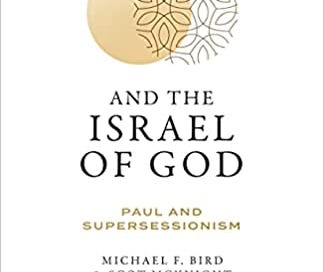A month ago, our book, God’s Israel and the Israel of God came out. It is a book that deals with the hairy topic of Paul and supersessionism (i.e., does the Gentile church replace the Jews as God’s people?).
Ben Witherington III (i.e. BW3) is a contributor to the volume and in a recent blog post, he responds to the essays by myself and Scot McKnight.
“This would be a good book for a Pauline theology or exegesis class, but also for a class on the relationship between early Judaism and early Christianity.”
At one level, BW3 is correct about Romans 9-11. (1) Paul uses “Israel” here to refer to ethnic or empirical Israel, i.e., the Jewish people; and (2) Paul does not envisage two peoples of God, but Jews and Gentiles united together in Christ, with non-believing Jews temporarily estranged from God because of their unbelief.
Though one line from BW3 did make me turn my head sideways:
The righteousness and grace of God, should not be equated with terms like ‘covenant faithfulness’. No, God is being true to his own nature, and has no obligation to be faithful to a covenant that has been broken. He will have mercy on us all, because he loves us all, and desires all of us to be saved.
I don’t think God’s righteousness can be reduced to covenant faithfulness, while all covenant keeping is “righteous” everything “righteous” is not necessarily tied to a covenant. But, if you like at Ps 98, you’ll see that God’s righteousness is related to both his desire to establish justice among the nations and his faithfulness to Israel!
In my mind, there are two important verses in Romans 11 for us to consider:
First: “You will say then, ‘Branches were broken off so that I could be grafted in’” (Rom 11:19). This verse rules out a hard supersessionism whereby the church replaces the Jews as God’s people. Paul flat out denies that Jews have been voted off covenant island to be supplanted by a Gentile church.
Second: “If they do not persist in unbelief, they will be grafted in, for God is able to graft them in again” (Rom 11:23). This verse rules out a sonderweg, the view that Jews can be saved apart from faith in their Messiah. Paul denies that, his fellow Jews need to come to Jesus their Messiah.
Paul rules out both a hard supersessionism and the view that there is a second track to salvation for Israel without Jesus.




